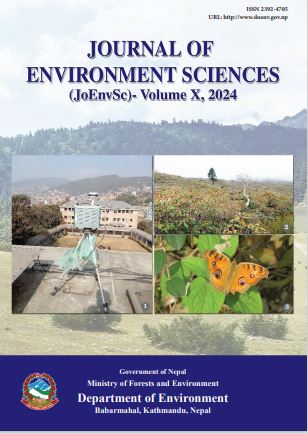Enhancing Water Quality in Biu, Borno State, Nigeria: Impact of Storage Duration on Sachet Water
DOI:
https://doi.org/10.3126/jes.v10i1.66986Keywords:
Effect, quality, sachet water, storage duration, world health organisationAbstract
Concerns about expiry date and the purity of sachet water sometimes become evident after it has been stored for a long period. This study aimed at assessing the effects of storage duration on physicochemical and microbial parameters of some selected sachet water sold in Biu Local Government Area of Borno State, Nigeria. Four different sachet waters were sampled (A B C and D), for their physicochemical and microbial parameters using laboratory analysis by standard analytical procedures to ascertain the storage duration variation and the level of compliance with the National Agency for Food and Drug Administration and Control (NAFDAC) and World Health Organization (WHO) standards specification for drinking water. The results reveal that most of the parameters such as pH, turbidity, total dissolved solids, nitrate, dissolved oxygen, manganese, iron, salinity, total hardness and alkalinity, within 24 hours, 1 month, and 2 months of production vary and, has meet levels of standards that is set by the WHO and NAFDAC, except few parameters. Only phosphate exceeded the standards within 24 hours, 1 month, and 2 months of production, but for microbial, all the parameters for each sample A, B, C, and D and storage duration within 24 hours, 1 month, and 2 months of production has a wider increase respectively, and they exceeded the levels of standards set by WHO and NAFDAC. The increase in microbial counts over time suggests deterioration in water quality during storage, highlighting the need for improved sanitation practices, stricter quality control measures, and regular monitoring to ensure safety of sachet water throughout its shelf life.




